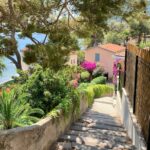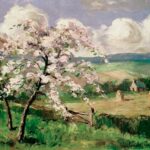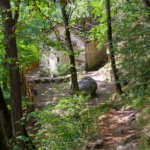Pictured above is a photo that I took of a sunset while circling around in a boat around the beautiful Greek island of Santorini. What is the sun? It is a ball of fire, one that we cannot ever touch. But we can experience it and know it through its energies on earth. A flower knows the sun because it blooms. Human skin knows the sun as it touches us in warmth. Water knows the sun as it boils, and then tea also experiences the sun. Ice melts knowing the sun, and water nourishes the earth, and so earth too comes to know the sun. I can go on and on with metaphors as I am a poet after all – but what this shows us is the distinction between essence and energy.
The sun’s essence may be untouchable, just as God’s essence is too; but the sun’s energies on Earth can be experienced and are evidenced by changes that they induce such as melting, hardening and growing. In the same way God’s energies can be experienced in a more spiritual sense – the melting of hearts through love, generosity and compassion, the hardening or icing of hearts, divine inspiration and miracles, and the spiritual growth through our opening of the inner realm.
The important point to remember is that while God is unknowable in his essence, and cannot be explained or limited to words, his can be known i.e. experienced in his energies – and such experience changes neither who or what God is nor who or what the one experiencing God is. Just as a rose does not become the sun simply because it soaked up the light and warmth and grew, nor does a person who soaks up the warmth and light of God and spiritually grows ever become God—though such may be called a child of God.
Essence, Energy and the Holy Mystery
In Eastern Orthodox Christianity this distinction between essence and energy is found in the original texts of the New Testament. For those who don’t know of this, the original texts were written in Greek, before they were ever translated in Latin and then English, and I’ll take you to St. Paul writings where he uses the Greek word enérgeia over thirty times, which literally translates to energy in English.
But back in the day, a thousand or so years after the Greek texts were written, when they were translated in Latin, the only way they could translate enérgeia at that time was to use the Latin word operatio – which in English translates to workings, and this is how you’ll most likely read it in English Bible scriptures.
In Eastern Orthodoxy, God’s essence is known as ousia, which is distinctly different from God’s energy. Ousia, or God’s essence, is that which remains unchanged and exists by itself because it is fully realized and does not need to create to realize itself. The essence is pure and true and independent, as it does not change nor is it influenced by the way others respond to it or what they choose to do. God’s essence is immaterial and eternal and unchanging despite its participating and creating. Just like love is, which is why God is love.

Ios, Greece
Love comes in various shapes and forms and has many different speeds and movements – it is found in compassion, kindness, grace, forgiveness, joy, creativity, appreciation, humility, tenderness, generosity.
And once it touches us, once grace and kindness touch our hands, our hands will scent of its aroma long after, and the aroma will then touch the hands of others also.
When we express love through our actions and choices we become embodied in love. A love that’s not embodied remains only a beautiful idea in the sky.
The doorway to love is our heart, and being able to generate these holy emotions in us and then through us. This means – to know God, develop the heart.
When our heart center is developed, we begin to experience more compassion, empathy and inspired creativity. We become spiritually aware and begin to see things beyond ourselves developing a natural selflessness. We experience a natural interconnectivity with the world around us and how all flows in unison and is interdependent.
When our heart center is developed, we embody love in our every day gestures and movements, we become it, we live it – we live in love. And what drives us forward is our desire to contribute, evolve and love even more.
When our heart center is not developed, we become selfish, materialistic, look for things and pleasure outside of us, infuse doubt and fear on others, are unkind and lack compassion, become egoistic and narcissistic. Our drive is to take and gain, rather than give and contribute.
The Holy Mystery sits at the heart of Eastern Orthodoxy in that while we cannot describe or name God nor ever touch him, we can experience him. And we can find him in our present moment if we have the clear eyes of the heart to perceive its light. His essence manifests through all around us, but often times we cannot perceive it because hearts are closed, minds are unclear, and tainted by distractions and fogginess of emotions, or conditions, expectations, prejudice and biases. But it is his energy that essentially fills us with life and vitality – and we are the vessel through which he can imprint on us his energy and virtue – which is to love and be of kind service to humanity.
In Eastern Orthodoxy the belief is that we are the co-creators – which from the original texts was described as synergy.
The synergy is that when we become open to receive God’s energy through us and respond to it through our free will of words, hands, actions and ordinary gestures in our every day life – our acts becomes his acts.
In the West i.e. Roman Catholicism, this distinction between energy and essence was a bit lost in translation, thereby leading to more of a predestination idea or monarchism or mono-energistic thought rather than the presence of free will following the distinction between energy and essence.
In other words – we don’t just sit there, but we need to be open to receive. His energy works through us for the good and he presents the good to us in various shapes and forms, speeds and movements, but we then have to respond to that which he presents to us through our actions, will, choices and decisions – which depends on our inner development.
This brings me to another concept and mystical teaching known as the uncreated light, which in the scripts refers to the transfiguration of Jesus Christ where people could see the radiance of light around him on the mountain. They wondered was it always there, why are we only now and only some of us seeing it? In modern spirituality or the New Age this concept is often referred to as your unlimited potential, unlimited creativity, untapped creativity and unmanifested higher self. And now I’ll bring you back to the sun metaphor in the beginning: Do you see the sun when the windows are unclean or with veils?
The uncreated light is always there, and this is the part of the essence that hasn’t yet been manifested tangibly from energy – because we need to first open our eyes to perceive it. Only then we’ll see it.
His presence is always there and always has been and always will be – but we need to cultivate the ability to sense it; we need to clear the eyes of the heart, and gain clarity from all the other things that tainted or distracted our view.
And here comes the Holy Mystery which is a big part of Eastern Orthodoxy and mysticism:
we were never meant to know it all anyway, and the humility of this deserves to be treasured.

Glozhene Monastery in Bulgaria
God’s essence is beyond being, beyond our knowing and it is unnameable, though we can name the ways in which he manifests for us. In the West there is a lot of emphasis on the explaining and logic and rationalizing the theology – but in the East the emphasis is on the inner path and inner development, as not all answers will be available to us, and they shouldn’t be anyway. We can’t ever understand or know fully something beyond us because we are conditioned to human understanding and limited in our mind and thoughts. The old original scriptures are full of divine mystery, which is why Eastern or Greek Orthodoxy is closely and very intimately related to ancient mysticism; we can’t name or describe something beyond our knowing, and God will always have his own secretive being that cannot be philosophized nor written.
This is also why in Eastern Orthodoxy the Pope is not seen infallible, which is a main point of difference between the East and Catholicism – as he is human, and not human is God, and all humans are imperfect and flawed to some extend. Per the East, the original scriptures are not to be changed and continue to be open to interpretation, which is not the case in the West, where the Pope has the authority to change scriptures. The East focuses more on the practice through virtues and prayer and the inner world, rather than theology and logic, and no one person is “above” the rest – decisions when made are made by all patriarchs, bishops, priests, clergy and the people, all together.
The Holy Mystery is something I believe in – because not all will ever be found in text and script, and we should develop the church within, in the home of our hearts. Faith doesn’t end once we exist the cathedral, church, monastery, ashram or temple; faith, and love, are what we must embody through our actions.
Naturally as human beings we want to know things because knowing gives us a sense of stability in this uncertain thing called life. Knowing gives us comfort and soothes our worries and fears. This is why we are obsessed with information, categories … because when we shape something into a kind of a box or through words we can have a sense of control in that “knowing” of it, seeing of it. It protects us from heartbreak and disappointment.
But that’s not how life works, that’s not how love works neither. One of our greatest lessons in life is trust. And we can’t have trust if we know it all, we can’t have faith if we know it all, we can’t express love if we know it all. Devotional is the pathway through which awareness shows its beautiful face – and that pathway is through the mystical lands of our heart and the inner light. And yet as much as we learn and deepen into understanding, there are things we’ll never fully know – because we were never meant to know it all anyway. The humility of this deserves to be treasured.
And when we leave space for the unknown, on the blank pages of our book, God breathes, and we do too; and then life itself has the space to surprise us in wonderful ways – and for miracles to happen.

For more of my writings, browse through my Art of Love.
If you wish to support me and my work, you may do so by sharing it or donate here. For personal readings with me, you may visit my Offerings.
Your support means so much to me! Thank you wholeheartedly!




